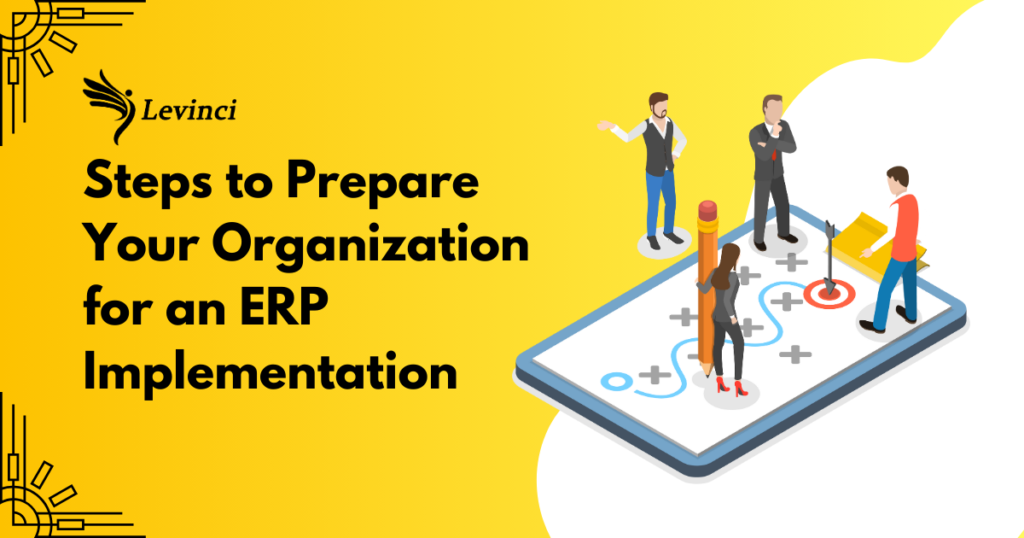The implementation of an Enterprise Resource Planning (ERP) system can be a complex and challenging process. This process requires careful planning, preparation, and execution to ensure its success. In this article, we will discuss the steps that organizations should take to prepare themselves for an ERP implementation.
Why business should prepare for ERP Implementation
ERP implementation refers to the process of installing, configuring, and integrating an Enterprise Resource Planning (ERP) system into your existing business operations. It’s essentially bringing all your departmental functions under one roof – a complex but highly rewarding undertaking.

- Bridging the data gap: Many businesses struggle with information silos, where departments operate with their own data sets, often outdated or inconsistent. ERP implementation breaks down these walls, creating a single source of truth. This means everyone from sales and marketing to accounting and production has access to the same real-time data, ensuring better decision-making across the board.
- Streamlining operations: Imagine the time wasted on manual tasks and duplicated efforts when departments aren’t connected. ERP automates repetitive processes, freeing up employees for more strategic work. Sales reps can focus on closing deals instead of chasing down inventory updates, while production can plan more effectively with accurate demand forecasts.
- Enhanced visibility and control: With a centralized ERP system, businesses gain a holistic view of their operations. Financial reports become more accurate, inventory levels are transparent, and production bottlenecks are easily identified. This newfound visibility empowers businesses to optimize resource allocation, reduce costs, and make data-driven decisions for continuous improvement.
- Improved collaboration: ERP fosters a more collaborative work environment. Departments can share critical information seamlessly, track project progress in real-time and eliminate communication gaps. Imagine a scenario where marketing teams can tailor campaigns based on real-time sales data or production can adjust schedules based on upcoming customer orders.
Learn more about the ERP implementation process
6 steps to prepare your business before ERP implementation

Identify existing problems
Before embarking on an ERP implementation, it is crucial to identify the existing problems and pain points within the organization. This includes assessing current processes, systems, and workflows to determine areas that need improvement. By understanding the specific challenges and requirements of the organization, businesses can better align the ERP system with their needs and goals.
Set clear goals and scope
Setting clear goals and defining the scope of the ERP implementation is essential for success. This involves identifying the objectives and outcomes that the organization wants to achieve through the implementation. It is important to establish realistic and measurable goals that align with the overall business strategy.
Defining the scope of the implementation helps in determining the modules and functionalities that will be included in the ERP system. Furthermore, setting clear goals will help businesses measure the success of the project after completion.
Prepare and migrate data
Data migration is quite a difficult phase and preparing to migrate data are important step in the ERP system implementation process. Therefore, businesses need to have an experienced team and understand the organization’s unique requirements to perform more smoothly.
To migrate data to your ERP system, you must clean and format your current system’s data for compatibility with the new system. This includes assessing, preparing, and transforming all existing data into a format compatible with your ERP software.
Create an ERP post-implementation plan
Planning for the post-implementation phase is often overlooked but is equally important as the ERP implementation. Businesses should develop a post-implementation plan that outlines how they will monitor and evaluate the performance of the ERP system. This includes defining key performance indicators (KPIs) and establishing processes for ongoing maintenance, support, and continuous improvement.
Choose suitable ERP
Choosing the right ERP system plays an extremely important role in bringing success to ERP implementation. Businesses should evaluate different ERP vendors and solutions based on their specific requirements and goals. Factors to consider include functionality, scalability, ease of use, integration capabilities, vendor support, and cost. It is advisable to involve key stakeholders in the selection process and conduct thorough demos and evaluations before making a decision.
Training for employees
When preparing to deploy a new ERP system, employees need to adapt to changes in processes, software, navigation, and technology quickly. Therefore, businesses need to organize a comprehensive training program to familiarize employees with the new system and understand its functions.
Clear documentation should be created to guide users on how to perform tasks in the ERP system. Ongoing support should also be provided to address any issues or concerns that may arise during and after the implementation.
Implement ERP solutions with Levinci
Implementing an ERP system is a significant decision for any business. It can streamline operations, improve efficiency, and provide valuable insights to drive growth. However, the success of an ERP implementation depends on choosing the right solution and partner. Levinci is a leading provider of ERP solutions that can help businesses achieve their goals effectively and efficiently.
Levinci offers a comprehensive suite of ERP solutions that cater to businesses of all sizes and industries. Whether you are a small startup or a multinational corporation, Levinci has the right ERP solution for your specific needs. Their industry-specific solutions can help you optimize your operations, improve productivity, and stay ahead of the competition. With Levinci, you can have a single integrated system that connects all your business processes and departments.
Conclusion
By preparing your organization for an ERP Implementation, you’ll be well-equipped to ensure the long-term success of your ERP system and maximize its value for your organization. Contact Levinci today to learn more about their ERP solutions and how they can transform your business.
learn more about:

